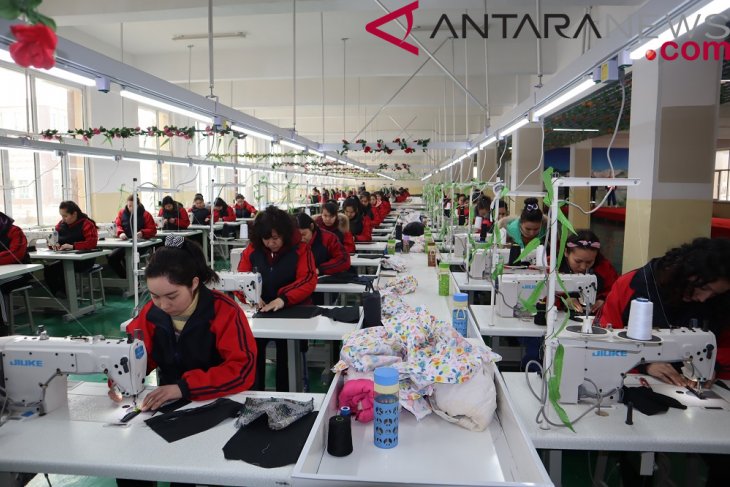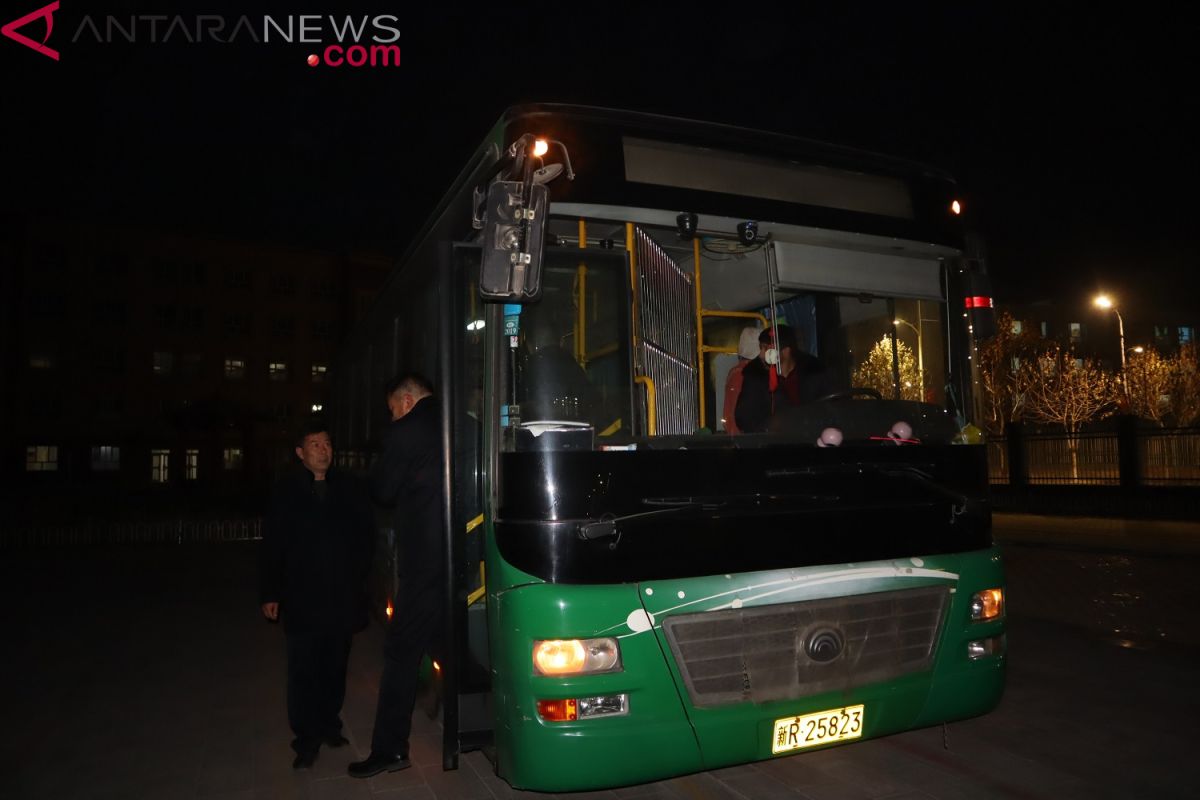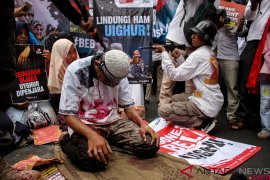Although the bus did not look like the typical bus for prisoners in Indonesia, the presence of steel trellis installed as a partition to the driver`s seat made the bus appear slightly different to the ones usually seen on the streets.
A bus full of passengers had left the Vocational Training Center, located in one of the underdeveloped areas in Xinjiang Autonomous Region on Saturday (Jan 5) morning.
However, Antara was able to interrupt the other bus that was getting ready to take the trainees of the Vocational Training Center back to their homes in the village bordering India and Pakistan.
Meanwhile, inside the "camp," a number of trainees were occupied with their activities. Some were seen dancing and singing, while others played the Uighur traditional musical instrument alongside those singing songs in the local language. Some of them were concentrating on the movements of their paint brushes and the color strokes on their canvases.
In another corner of the "camp," a number of residents were perfecting their skills in the kitchen and others were dressed up like attendants and hosts in five-star hotels.
"Before I came here, my capabilities were yet to be honed," stated 20-year-old trainee, Adilla, while setting up dishes that mainly consisted of lamb and beef in the cooking classroom of Moyu "camp."
Behind her were a group of chefs who were concentrating on the dishes they were cooking, some were chopping up vegetables and stirring rice on a wok, while the other were seen making desserts.
Everyone was busy with their activities. Although it was only 7 a.m. and the sun was still reluctant to shine upon the area, it was not a strange sight in the "camp," as the activities usually start at 6 a.m. local time and end at 6 pm every day.
The dark atmosphere and quiet streets in front of the "camp" did not stop the activities from starting on time every day.
Before getting the chance to have a taste of the dishes made by the trainees, Antara had to move to another location in the city of Hotan.
Daylight had started to come in when some trainees, dressed in workout clothes, carried out activities in the basketball court in front of the main class room of the "camp" in Hotan. Apart from dancing lessons, there were also classes for hair styling and manicure and pedicure.
A 30-year-old trainee, through a Mandarin translator, told her story of living in her village.
"I was indoctrinated and forced to wear a veil (niqab) until I was rescued and brought here," said Pazilet Wubur, occasionally pausing from doing her makeup practice, speaking in the local Uighur language.
The woman, adorned by golden, curly locks, admitted that she could come and visit her child in the village every Saturday after class and return to the "camp" the next night.
Much like other residents there, Wubur hoped to be able to get a job after finishing her education in Mandarin language, national constitution and other skills.
She believed that the facilities provided in the vocational "camp" were very much different from those in her village, especially considering the fact that there are telephone booths she can use to contact her family, free of charge.
Poor

So far, there are still pros and cons towards the training model implemented in the "camp." International activists are highlighting for various reasons concerning human rights violations, as there are indications that the model of vocational training and education within the "camp" is classified as practice of restraint and castration.
China has many times denied the allegations that the institution was established as an effort to equip the Uighur ethnic minority group that is still living in the poverty line up until now.
Xinjiang Governor Shohrat Zakir believed that efforts to break the chain of extremism that triggered a series of bloody conflicts throughout 1992-2015 will be effective if accompanied by increased self-capacity.
The people of Uighur, who live in the desert in southern part of Xinjiang, reportedly only earn around 300 to 600 RMB per month, which is around Rp630 thousand to Rp1.2 million per month, making south Xinjiang placed far behind other areas in China. Not only that, it also became difficult for the Uighur ethnic group to lift themselves out of poverty.
Some of the people who have completed their programs from the vocational "camps" can now earn more, ranging from Rp1,600 to Rp2,000, which is equal to Rp3.6 million to Rp4.4 million every month, with the skills they are now equipped with.
For that reason, the Chinese government has planned to continue the development of similar institutions. Governor Zakir even targeted that every district or city in the southern part of Xinjiang would have such an institution established.
The smallest camps are projected to have the capacity of 300 to 700 people, while the biggest ones can contain up to one thousand people. At the moment, there are at least 19 similar "camps" in the south.
In response to the negative feedback he had received, Zakir made an invitation for those who made negative comments to visit Xinjiang, based on the intentions to invite them to make objective judgment based on the situation on the ground.
"We welcome various communities in the world to see the real situation. We also hope that those who come would not interfere with China`s internal affairs and national unity, because we wanted to promote happiness in to our society," he remarked at an exclusive meeting with five foreign news agencies, including Antara, in Urumqi on Saturday (Jan 5).
Besides the pros and cons, involving humanity issues in the "camps," another issue that is believed to be important to highlight is China`s concrete strategy to strengthen domestic economy in facing global shifts, especially in the midst of the rivalry in the face of the United States` dominance.
They are not merely establishing "camps," but also industrial areas around the vocational institutions that have been prepared with attention to business prospects.
One of the examples is the garment factory in the village of Gazong, Xiaoerbage district, located not too far from the Hotan City "camp."
Another important issue to highlight is the spiritual fulfillment towards the residents, the majority of whom are from the Uighur ethnic Muslim group, as there are no supporting infrastructures in the "camps."
Unfortunately, Zakir, who is also from the Uighur ethnic Muslim group, did not provide a specific answer to Antara`s question regarding the lack of facilities to fulfill the rights of the trainees to carry out their spiritual obligations.
"The food and accommodation are free of charge. After they graduate, we never restrain or prohibit them from returning back to the community," explained Zakir, who is also the Deputy Secretary of the Chinese Communist Party for the Xinjiang Committee.
Apart from Zakir`s claims, the existence of the "camps" had indeed led to controversy.
Member of the UN Committee on the Elimination of Racial Discrimination, Gay McDougall, in August last year, cited the estimates that 2 million Uighurs and Muslim minorities were forced into "political camps for indoctrination" in the western Xinjiang autonomous region.
In an interview with Reuters, he expressed his concerns over the existence of such "camps."
"We are very concerned by the number of credible reports we received, which state that in the name of war against religious extremism and to maintain social stability, China has transformed the Uighur Autonomous Region into a large "camp" shrouded in secrecy and much like a `zone with no rights,`" he pointed out during the beginning of regular studies on China`s human rights records, which included Hong Kong and Macau.
Reporter: Irfan Ilmie, Aria Cindyara
Editor: Gusti Nur Cahya Aryani
Copyright © ANTARA 2019









